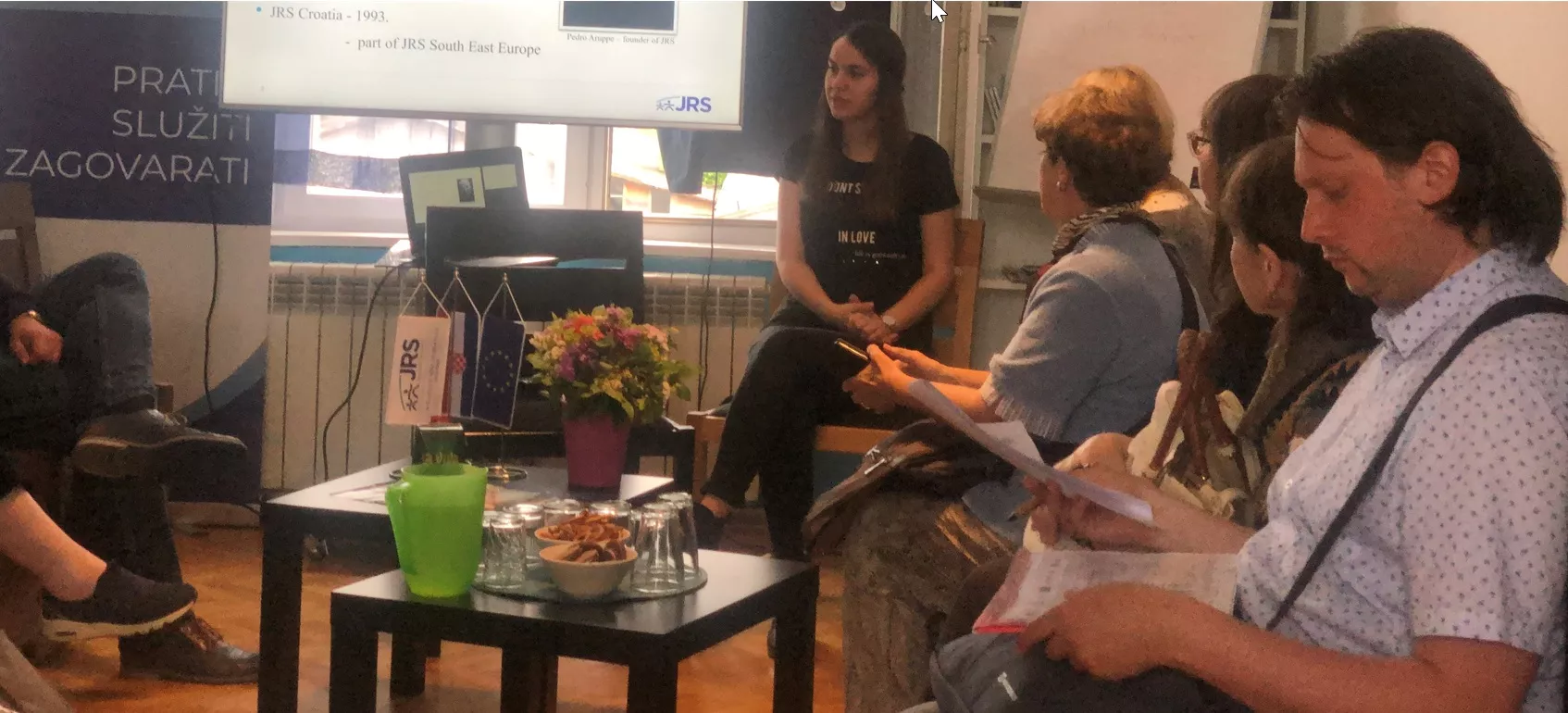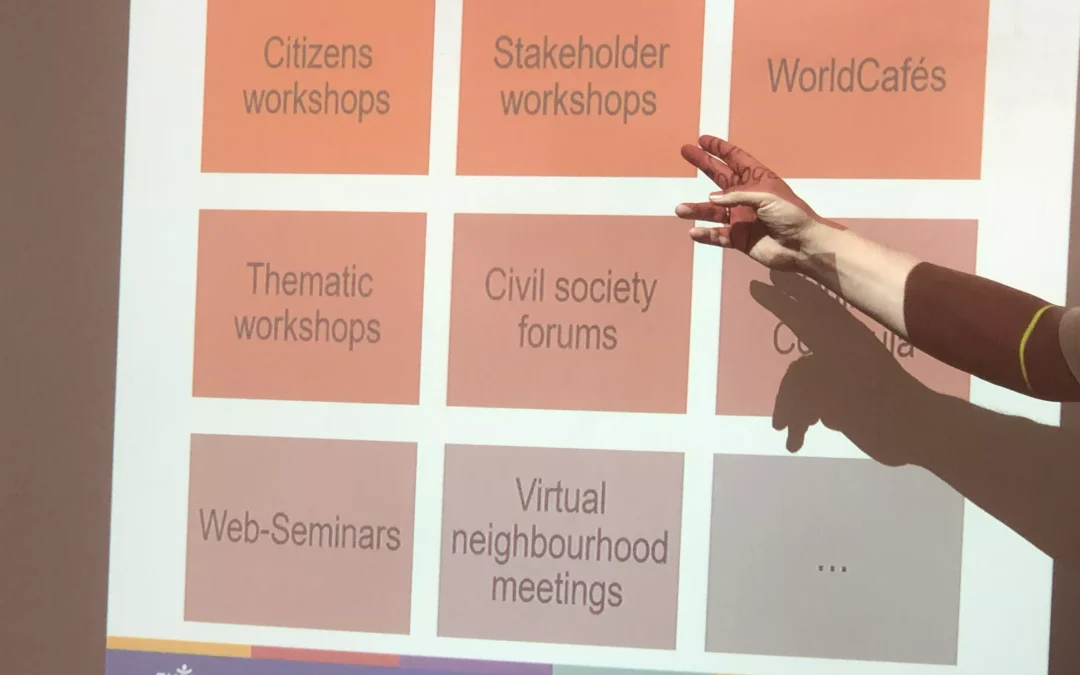DAICE is an ERASMUS+ K1 project on Digital Approaches for Intergenerational Cultural education.
The DAICE partnership has agreed on three topics: digitalisation, culture and intergenerational learning
It is nice to exchange knowledge, it is even nicer to get familiar with the strengths of your partners and in parallel to channel your efforts towards a future common project proposal knowing exactly what the contributions of partners could be.
The DAICE partnership had jointly agreed on three topics to be presented together of our organisations or institutions, their permanent activities and their project results. Open University Zagreb, our host, did perfectly comply with the partnership’s decision.
In accordance with the areas of partner organisations’ mission, their fields of activities and the three above mentioned topics, Vedran Tomšič, Head of the Lifelong Learning Department, Development and EU projects at POUZ together with his colleagues built the programme of the meeting and organised visits to selected local organisations. POUZ hired a small bus to take us smoothly from one organisation to another. Some of the visits and presentations, however, were virtual.
What, or better who, is POUZ?
POUZ is a folk high school. The first lecture there was delivered by the philosopher Alfred Basal as soon as 1912. Today, POUZ is meant for children, older learners and young adults who dropped out of school or simply want to learn in a different way in the field of catering, cooking, culture, different issues related to social roles, etc. Its participants are young people, beneficiaries of social welfare care and POUZ devotes its energy to the so called creative social inclusiveness. So far, POUZ has conducted projects like KRUG on cultural art for citizens – with citizens co-creators of music, art workshops, etc. Another project was for children with disabilities who were taken into the country under the direction of an artist. There they created impressive hay sculptures which made them visible in many aspects.

Third age participants were dealing with Nature and Parks of Zagreb and their own stories about the green areas of the city. They used their digital competencies »to stage« this green heritage on screens.
RECRAFT dealt with traditional crafts for modern times and the project PRIDE with the unemployed people with disabilities.
Research for all and digitalisation are concerned with all areas of social life
Zentrum für Allgemeine Wissenschaftliche Weiterbildung, ZAWIW and Slovenian U3A are both putting accent on citizen’s science/research for all and civic participation and on on-line participation in education since people are getting older, like staying at home and have grown to like remote learning. During the COVID-19 times they discovered some “online advantages” and would like to be able to stay at home and study on-line while being connected with and belonging to a study group. The city of Ulm is planning the digitalised future of the town and is particularly interested in areas like demography and education of older people in cooperation with ZAWIW.
Interested both in the past and future of today’s world
Zavod za proučavanje kulturnog razvitka, ZAPROKUL is a research organisation (54 years old) located in Belgrade, collecting and interpreting cultural data for the government as well as supporting a digital cultural archive with currently 1,700 entries.
Zavod ZAPROKUL examines different aspects of culture. In their eyes culture is a holistic way of life, digitalisation included. They deal with theories of culture and cultural policies, needs and traditions of the general populations as well as those of specific social groups. Moreover, they deal with gender equality in culture and other related issues. Since 1968 this institution has been publishing KULTURA, an interdisciplinary Journal of Theory and Sociology of Culture. ZAPROKUL follows national and international cultural events etc. It is interested in the past and future in the today’s world. The organisation has been researching the issues and dilemmas of culture. In our future projects, this institution together with ZAWIW could deal with the culture of digitalisation.
Slovenian U3A has a long tradition in intergenerational learning theory and practice. Moreover, It is specialized in visual literacy in older adult education. University Angel Kančev in Ruse (Bulgaria) and the Association Writers’ League have become specialised in older generations and have been working together in different ways for a decade or so (Danube Networkers, DANET).
Why the POUZ organisation of this first DAICE meeting was so special?
In projects visiting organisations is rarely both supplemental and complementary to the programme of the meeting. In the DAICE first meeting this was not the case. Since Slovenian U3A used to be in the RefugeesIn project the whole group visited JRS a Jesuit organisation for refugees. ZAPROKUL, University Angel Kančev and Association The Writers’ League Banat Branch deal with culture and arts, so we visited POGON a community centre for artists – ZAWIV is devoted to older people and digitalisation, so we went to so called repair shop and Hackers’ place dealing with technological socialisation and social changes.
All partner organisations are involved in public campaigning in education helping to overcome the eventual passive attitude of learners, who are ready to learn, but not to act.
The presentation of the Mediterranean Film Festival, currently taking place in eleven localities in the Adriatic Sea islands, small localities with at most 5,000 inhabitants. We were amazed by their step by step approach to the film festival project, their way to deal with authorities, rehabilitating old “socialist cinemas”, raising funds for the expensive equipment, making the audience of all ages loyal, working with schools and pupils, distributing films, creating their own film platform and distribution of quality author films.
Dr Dušana Findeisen (dusana.findeisen1@gmail.com), Slovenian U3A

